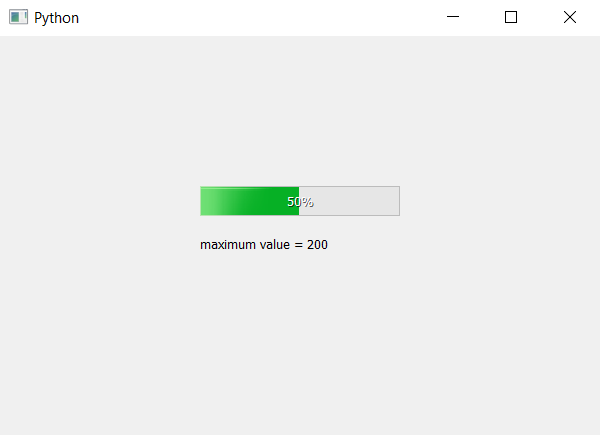Barra de progreso en PyQt5 nos permite establecer el rango de valor para la barra de progreso. maximumEl método se utiliza para obtener el valor máximo de la barra de progreso, es decir, el límite superior del rango. Este método devuelve el valor entero, si no configuramos el rango por defecto es 100.
Sintaxis: bar.maximum()
Argumento: no requiere argumento
Retorno: Devuelve entero.
Código:
# importing libraries
from PyQt5.QtWidgets import *
from PyQt5 import QtCore, QtGui
from PyQt5.QtGui import *
from PyQt5.QtCore import *
import sys
class Window(QMainWindow):
def __init__(self):
super().__init__()
# setting title
self.setWindowTitle("Python ")
# setting geometry
self.setGeometry(100, 100, 600, 400)
# calling method
self.UiComponents()
# showing all the widgets
self.show()
# method for widgets
def UiComponents(self):
# creating progress bar
bar = QProgressBar(self)
# setting geometry to progress bar
bar.setGeometry(200, 150, 200, 30)
# setting maximum value of progress bar to 200
bar.setMaximum(200)
# setting value to progress bar
bar.setValue(100)
# getting maximum value of progress bar
value = bar.maximum()
# creating label to print the value
label = QLabel("maximum value = " + str(value), self)
# adjusting the size of label
label.adjustSize()
# moving the label
label.move(200, 200)
# setting alignment to centre
bar.setAlignment(Qt.AlignCenter)
# create pyqt5 app
App = QApplication(sys.argv)
# create the instance of our Window
window = Window()
# start the app
sys.exit(App.exec())
Producción :
Publicación traducida automáticamente
Artículo escrito por rakshitarora y traducido por Barcelona Geeks. The original can be accessed here. Licence: CCBY-SA